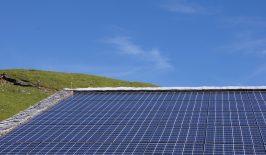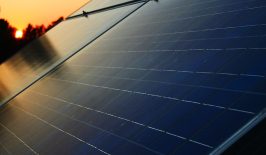A Portuguese startup has created a plug and play photovoltaic system that makes it easier than ever for people to become solar energy producers.
BeON Energy’s goal is to revolutionise – and decentralise – the energy market by offering consumers a new and super simple way to set up their own home solar systems: in the form of DIY, plug and play solar kits that you don’t need specialist technological knowledge to install. Key to BeON’s technology is a microinverter: a device that allows any PV panel to be connected directly to an ordinary wall socket, safely and easily, just like any other household appliance.
Rui Rodrigues is the Portuguese entrepreneur and CEO behind BeON Energy, and RESET talked to him to find out more.
How does the BeON kit work exactly?
The BeON kit comes in a box with everything you need to start producing your own solar energy: the solar panel, the support frame, our plug-in converter, and a power cord. It is all preassembled, so just chose a sunny place and find the nearest wall socket, in 15 minutes you can be producing your own green energy.
The entire process is designed to be plug and play so that it’s possible for everyone to install it on their own and plug it into any common household electric socket. Instead of consuming energy, the BeON KIT produces energy and injects it into the socket. And since all the electric sockets are connected among themselves, through the existing electric wiring, the energy is able to reach every home appliance in a very simple and economical way.
All of the complexity of the energy conversion and the control algorithms was moved to our electronics, which guarantee complete safety and automatically control the energy flow. Any home appliance requiring energy would get your own green, free, and locally-produced energy first, before buying any energy from outside suppliers.
How much energy can you produce with one of these kits?
Each BeON kit is quite powerful and can provide enough energy for up to 3 fridges, 5 laptops or 50 LED lights. If more energy is needed, for example for electric cars or heating, the customer is free to connect numerous kits together to increase the power output. Additionally, the BeON Kits can also be connected to each other, to form larger systems for larger buildings, perfectly matching the energy consumption of the site, no matter how high it may be – from small apartments to offices, farms, and even factories.
How expensive is it? And are there any maintenance costs?
The BeON kit has been developed to be affordable – it costs around the same price as a regular TV.
In places where it doesn’t rain very often, all the panel will need is a simple clean with cloth in order to remove dust and ensure that sunlight will reach the converter and offer the best possible performance. The kit has been designed to withstand extreme weather and temperatures and it is the only solar system that is IP68-certified, meaning that it actually works even when completely submerged in water!
Can anyone use it? Or are there legal restrictions on its use in certain countries or areas?
Anyone can use it. In general, people have the right to produce energy for their own consumption (according to an EU directive). In order to further speed up the adoption of home solar energy, it would be great if every country’s regulator would make it clear on how to plug solar systems into wall sockets. Not just for self-consumption but for energy production in general. It has already been done in Switzerland, Portugal, Holland with great success, and Germany and other countries are following fast but making sure that more people were aware of it would encourage large companies to get involved and start offering the BeON KIT to their customers, thus speeding up citizen participation in green energy production.
What is next for BeON?
Despite having won a number of international innovation awards, BeON energy is still working hard on raising its profile and spreading the word about its product.
Alongside the solar kit, which is already for sale on our website, we are also releasing an app which will be available to every BeON kit owner and that allows users to take part in energy communities by trading the energy with their neighbours. We’re also partnering with local energy utility companies and their customers in an attempt to speed up people’s engagement and create partnerships between corporations and their customers.
We will be looking really closely at this idea to see if it helps people who are currently interested in producing their own energy but until now, didn’t have the resources to do it. That’s the incentive behind everything that we do.






